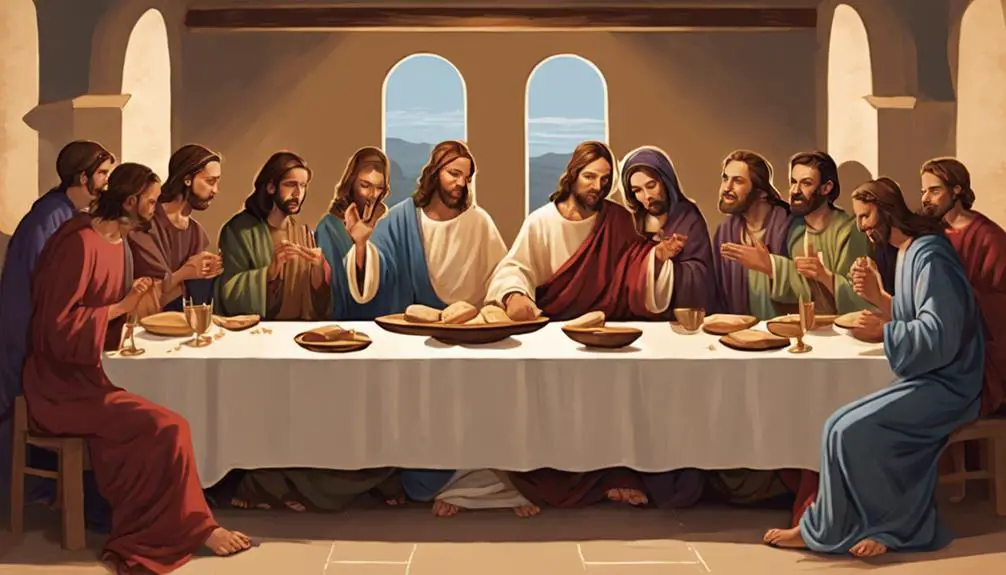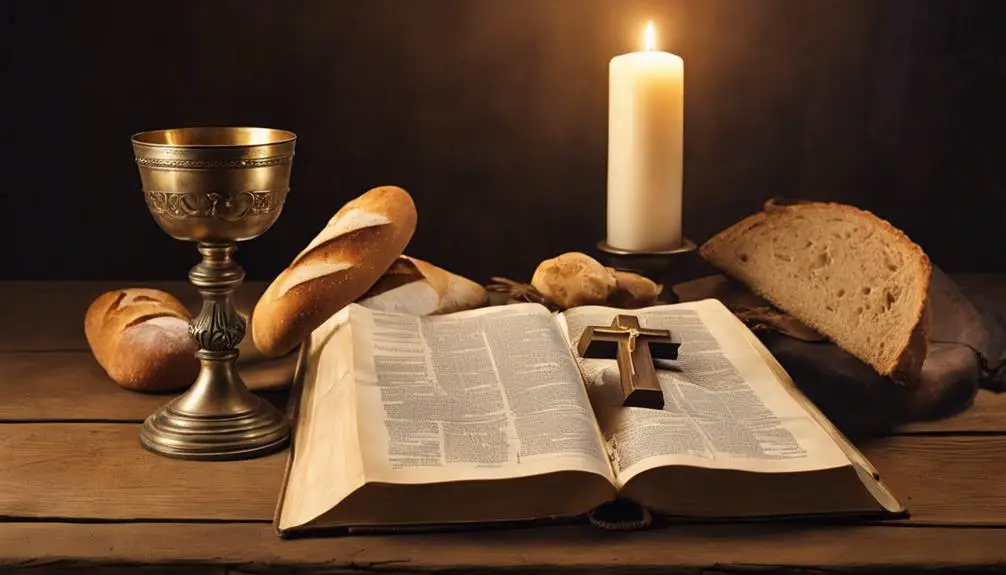Learn about the Bible verses that delve into the sacred tradition of Communion, and uncover the deeper meanings behind these sacramental passages.

What Bible Verse Talks About Communion
Taking a gentle look at the Good Book, you'll find the act of Communion, a sacred tradition, delicately woven into its pages.
But what specific verse paints the clearest picture of this holy sacrament? One fitting reference is 1 Corinthians 11:24-25.
However, this isn't the only passage that dives into the depths of Communion. There are others, perhaps less known, yet equally rich in context and meaning.
Eager to uncover these hidden gems? Stay with us as we journey further into this intriguing conversation.
Key Takeaways
- Key Bible verses on communion include 1 Corinthians 11:23-26, Matthew 26:26-29, Luke 22:19-20, and John 6:53-56.
- These verses emphasize the Last Supper, Christ's sacrifice, and the spiritual depth of communion.
- Contemporary interpretations highlight communion as a symbolic act nurturing a relationship with Christ and fostering unity.
- Understanding these verses enhances the appreciation and significance of communion in Christian worship.
Understanding the Concept of Communion

To fully grasp the significance of communion, you must delve into its biblical origins, its symbolic representations, and the profound impact it has on the Christian faith. This sacred act, also known as the Eucharist or the Lord's Supper, is deeply rooted in symbolism. Each element, the bread and the wine, carries a symbolic representation that's both powerful and poignant.
The bread, often unleavened, symbolizes the sinless body of Jesus Christ. It's a stark reminder of His selfless sacrifice on the cross, signifying His willingness to experience pain and suffering for the salvation of humanity. You're prompted to reflect on the depth of Christ's love and mercy each time you partake of the bread.
Conversely, the wine or grape juice symbolizes the blood of Jesus, shed for the forgiveness of sins. It's a potent symbol of the New Covenant between God and His people, a covenant sealed by the ultimate sacrifice. Every sip you take is a proclamation of your faith, a reaffirmation of your commitment to the path of righteousness, and a declaration of your gratitude for the divine grace bestowed upon you.
Understanding these symbols enhances your appreciation of the communion ritual and deepens your connection to the Christian faith.
Biblical Origins of Communion

Now that you're familiar with the symbolic significance of communion, let's trace its roots back to the Bible, where it first originated. The practice of communion, also known as the Eucharist or the Lord's Supper, has its earliest foundations in the New Testament, specifically the accounts of the Last Supper in the Gospels of Matthew, Mark, and Luke.
In the early Christian community, communion wasn't just a religious act but also a communal meal. It was a shared experience, a manifestation of the believers' unity in faith and love. The bread, representing Christ's body, and the wine, symbolizing His blood, were shared among believers as a memorial of His sacrifice.
Over time, the practice evolved, transitioning from a full meal to a symbolic sharing of bread and wine. This change was influenced by several factors, including the need for a more structured worship service and the desire to focus on the symbolic representation of Christ's sacrifice.
Communion's biblical origins underline its significance in Christian worship. Understanding its roots helps you appreciate the rich history and profound meaning of this sacred act. It's not just a ritual, but a tangible connection to the foundations of your faith.
Key Verses Discussing Communion

Delving into the key verses discussing communion, you'll uncover a wealth of insight and understanding that can deepen your appreciation of this crucial Christian practice. These verses offer vital context, shedding light on the origins and theologies of communion.
Let's examine four key verses:
Bible Verse |
Description |
|---|---|
1 Corinthians 11:23-26 |
This verse provides the clearest account of the Last Supper, highlighting Jesus' instructions to his disciples. |
Matthew 26:26-29 |
Here, Jesus institutes the Lord's Supper during the Passover meal, signifying the new covenant between God and man. |
Luke 22:19-20 |
This Luke passage echoes Matthew, emphasizing the breaking of bread and wine as Jesus' body and blood. |
John 6:53-56 |
This verse, while not directly about the Last Supper, gives theological depth to the concept of eating and drinking Jesus' body and blood. |
Analyzing these verses, you realize the profound depth of communion's scriptural basis. From its institution at the Last Supper to its theological implications, these key verses illuminate communion's integral role in Christian practice. Understanding these verses enhances your grasp of communion's sacredness, enriching your participation in this vital act of worship. Note: Avoid discussing things which would be discussed in the NEXT SUBTOPIC entitled 'Significance of Communion in Christianity'.
Significance of Communion in Christianity

Having explored the scriptural basis of communion, let's shift our focus to its significant role within the broader context of Christianity. Communion, also known as the Eucharist or the Lord's Supper, isn't merely a ritualistic practice. It's a profound symbol of unity, demonstrating the collective identity of believers as the Body of Christ.
Communion's symbolic significance extends further, representing the sacrifice of Jesus Christ for humanity's redemption. When you partake in communion, you're not just consuming bread and wine. You're acknowledging Christ's suffering and death, and his resurrection's triumph over sin and death. It's a moment of reflection on the grace and mercy of God, and a celebration of the New Covenant sealed in Christ's blood.
Moreover, communion is an act of obedience. Christ commanded his followers to 'do this in remembrance of me' (Luke 22:19). By participating in communion, you align yourself with Christ's teachings, demonstrating your commitment to him. Communion, therefore, is an essential component of Christian worship, a visible sign of an invisible grace, grounding faith in tangible action, and connecting believers to Christ and to one another.
Contemporary Interpretations of Communion Verses

In understanding the richness of communion, it's essential to consider the contemporary interpretations of the key biblical verses that speak about this sacred Christian act. It's through these interpretations that you'll uncover the diverse perspectives on communion and its symbolic significance in the modern Christian culture.
Here's a brief analysis of three significant communion verses and their modern interpretations:
Bible Verse |
Traditional Interpretation |
Contemporary Interpretation |
|---|---|---|
1 Corinthians 11:24-25 |
"This is my body…this cup is the new covenant…" symbolizes Christ's body and blood. |
The bread and wine are symbolic representations, reminding us of Christ's sacrifice. |
John 6:53-54 |
Eternal life is granted to those who consume the body and blood of Jesus. |
Communion is an act of spiritual nourishment, reflecting our ongoing relationship with Christ. |
Matthew 26:26-28 |
Communion commemorates the Last Supper. |
Communion is a communal act, fostering unity among believers and echoing Christ's love for his people. |
This table underscores the shift from a literal to a more symbolic understanding of communion. It's clear that communion, in its contemporary interpretation, serves as a spiritual act that nurtures relationships with Christ and promotes unity among believers.
Conclusion
So, you've explored the concept of communion, its biblical origins, key verses, significance in Christianity, and contemporary interpretations.
It's clear that communion is a profound, symbolic act, deeply rooted in scripture, notably in 1 Corinthians 11:24-26.
The diverse interpretations reflect the rich complexity of biblical text. Remember, communion offers a tangible connection to Christ's sacrifice, reminding you to live a life reflective of His teachings.



Sign up